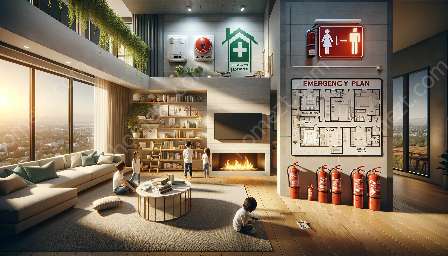Emergency escape plans are crucial for home safety and security, but the effectiveness of these plans can be significantly influenced by psychological factors. In this comprehensive guide, we will delve into the various psychological aspects that affect emergency escape plans and how to address them to promote safe evacuation.
Understanding Psychological Factors
Psychological factors play a vital role in shaping our behavior and decision-making during emergencies. Fear, panic, and stress can significantly impact how individuals respond to escape situations. Understanding these factors is essential for developing effective emergency escape plans.
Fear and Anxiety
Fear and anxiety are common emotions experienced during emergencies, which can affect the clarity of thought and decision-making. High levels of fear can impair an individual's ability to assess the situation and follow the escape plan. Addressing these emotions through proper education and training can help individuals manage their fear and anxiety during escape scenarios.
Information Processing
The way people process information during emergencies can be influenced by various psychological factors. Stress and panic may hinder individuals from accurately perceiving and comprehending instructions, potentially leading to confusion and disorientation. Clear and concise communication and well-defined escape routes can mitigate these issues.
Group Dynamics
In a household or community setting, the dynamics of group behavior can impact the execution of escape plans. Social influence and leadership dynamics can either facilitate or hinder the orderly evacuation of individuals. Understanding group dynamics and establishing clear roles and responsibilities within the group can improve the efficacy of escape plans.
Training and Rehearsals
Psychological preparedness is a critical component of effective emergency escape planning. Conducting regular training exercises and rehearsals can help individuals familiarize themselves with escape routes and procedures, reducing the impact of psychological factors during actual emergencies.
Enhancing Home Safety and Security
To ensure the effectiveness of emergency escape plans, it is essential to integrate psychological considerations with home safety and security measures. Creating a supportive and reassuring home environment can help alleviate psychological barriers to escape and enhance overall safety.
Environmental Design
The physical layout and design of a home can also influence psychological responses during emergencies. Clear signage, well-lit pathways, and unobstructed exits contribute to a sense of security and facilitate smooth evacuations. Designing homes with these considerations can positively impact the psychological aspects of escape planning.
Communication Strategies
Effective communication is crucial for addressing psychological factors during emergencies. Providing clear and consistent information, maintaining calm and reassuring communication, and practicing active listening can help manage fear and anxiety, ensuring a more controlled response to evacuation efforts.
Psychological Support
Recognizing the potential psychological impact of emergencies, it is important to offer support and resources for individuals and families affected by traumatic events. Access to counseling, mental health support, and debriefing sessions can aid in reducing the long-term psychological effects of emergency situations.
Conclusion
Psychological factors significantly influence emergency escape plans and can impact the overall safety and security of individuals and communities. By understanding these psychological aspects and integrating them into emergency preparedness strategies, we can create more effective escape plans and promote a greater sense of safety and security in our homes and communities.






